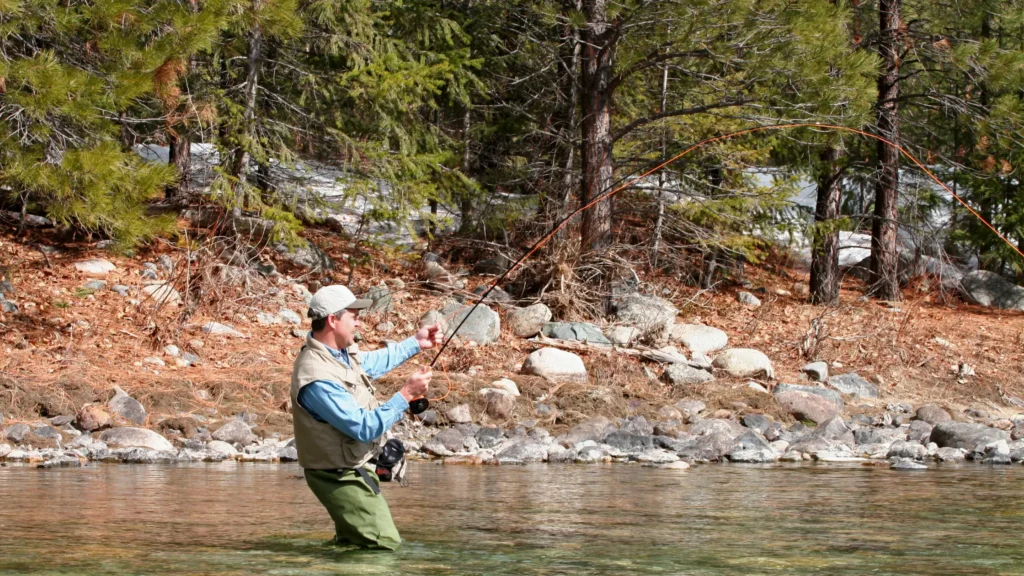The art of fly casting is beautiful and elegant, but it also takes practice and skill to master.
The thrill of catching a fish with a fly rod is more challenging and rewarding than traditional fishing methods.
It allows for an escape from daily stresses while connecting with nature and has created a passionate and welcoming community.
But Why is fly fishing so addictive? According to Harvard Medical School, fly fishing is so addictive because it offers numerous mental and emotional benefits. The repetitive motion of fly-fishing evokes the relaxation response, providing a counterbalance to stress. Being surrounded by nature, disconnected from electronics, and focused on a simple, repeated task, fly-fishing is often compared to meditation, which contributes to its calming effect. This combination of relaxation, stress relief, and immersion in nature makes fly fishing an appealing and addictive activity for many people.
Each time you step into the river, you have the potential to catch something new and exciting, whether it’s a trout or simply being surrounded by breathtaking scenery. The feeling of connection with nature while casting on the water can truly be therapeutic.
Escaping reality for just a few hours can give us the perspective we need to tackle our everyday challenges in life. We often forget how important it is to disconnect from technology and enjoy the simplicity of being outdoors.

Table of Contents
The Addictive Nature of Fly Fishing
Once you’ve experienced fly fishing for yourself, it’s hard not to become addicted. Something about the sport pulls at your heartstrings and keeps you coming back for more.
Maybe it’s the peace and tranquillity that can be found when standing waist-deep in a quiet stream, or it’s hearing your reel scream as a fish takes your fly. But perhaps the most addictive is mastering this art form.
Fly casting isn’t just throwing a weight at a distance; precision is key here! Mastering this skill requires patience, focus, dedication, and practice.
However, once mastered, there’s nothing like nailing that perfect cast right where you want it every time! This can keep any angler coming back time after time to perfect their craft.
If you haven’t tried fly fishing yet, then do yourself a favour: grab some gear (or rent), pick up some flies, and head to your closest river or stream. Give fly fishing a try and see why it is the greatest addiction you’ll ever have.
The Art of Fly Fishing: A Beauty to Behold
Fly fishing is a sport that is not only challenging but also incredibly beautiful. There is something magical about the way the fly line gracefully dances through the air and lands softly on the water. It’s an art form that takes years to master and can be incredibly rewarding.
The beauty of fly casting alone can be addicting, and it’s easy to see why so many people are drawn to this sport. One of the key elements of fly fishing is learning how to cast a fly line.
Unlike traditional fishing, where you simply cast out a lure, fly casting requires a bit more finesse. You must use your arm, wrist, and hand in unison to create a smooth motion that propels the line forward.
The result is not only functional but also visually stunning. Watching an experienced fly fisherman cast their line is like watching an artist paint a masterpiece.
Each movement is deliberate and precise, with the end result being nothing short of breathtaking. The beauty of this sport lies in its simplicity – it’s just you, your rod, and the natural world around you.
Mastering Fly Casting: A Never-Ending Journey
Fly casting may look easy at first glance, but mastering this technique takes years of practice and dedication. It’s a never-ending journey that can be both frustrating and rewarding at the same time. Even experienced fishermen are constantly refining their techniques in pursuit of perfection.
One reason why mastering fly casting can be so addictive is that there are always new challenges to overcome. Whether it’s trying out new casts or perfecting your accuracy, there’s always room for improvement in this sport.
Each small victory feels like a major accomplishment, making you want to come back for more. Another reason why mastering fly casting can be addicting is that it requires both physical and mental discipline.
You must learn how to control your movements, stay focused on the task at hand, and be aware of your surroundings. It’s a meditative process that requires patience and practice.
Finding Peace in Fly Casting
Fly casting can also be an incredibly therapeutic activity. There’s something about being out in nature and focusing solely on the task at hand that can help calm the mind and reduce stress. The rhythmic motion of casting can be almost hypnotic, allowing you to sink into a state of complete relaxation.
In fact, studies have shown that spending time in nature can have a positive impact on mental health. Fly fishing is the perfect way to combine the benefits of being outdoors with the peacefulness of meditation.
It’s no wonder why so many people find solace in this sport. Fly fishing is not just a sport – it’s an art form.
The beauty and elegance of fly casting alone are enough to draw people into this hobby. And once you start learning how to cast correctly, it becomes addicting because there’s always more to learn and new challenges to conquer.
Plus, it provides a calming escape from daily stresses while allowing us to connect with nature. Fly fishing truly is an addiction worth having!
The Thrill of the Catch
Fly fishing vs. traditional fishing methods typically involve using a bait or lure that is cast out and then slowly reeled back in. It’s often a waiting game for the fish to bite, and while there may be moments of excitement when you feel a tug on the line, there’s not always a guarantee of actually catching anything. Fly fishing, on the other hand, is more dynamic and hands-on. The angler uses a specialized fly rod and line to cast an artificial fly that imitates the fish’s natural prey. The artistry of casting is part of what makes fly fishing so unique; it requires skill and finesse to present the fly in a way that looks natural to the fish.
Challenging and rewarding
Catching a fish with a fly rod is not easy. It takes patience, persistence, and practice. But when everything comes together just right – when you’ve chosen the right fly for the conditions, made an accurate cast, and successfully hooked a fish – it’s incredibly rewarding.
There’s something primal about catching your own food that taps into our deepest instincts as human beings. And when you’ve done it using nothing but your own skill and ingenuity (plus maybe some help from Mother Nature), it feels like an achievement worth celebrating.
Escaping Reality
The Healing Power of Nature:
In today’s fast-paced and technology-driven world, it’s easy to feel overwhelmed and disconnected from the natural world. Fly fishing provides an opportunity to escape from the hustle and bustle of daily life and immerse oneself in nature.
The sound of flowing water, the sight of wildlife, and the sensation of standing in a cool stream can be incredibly therapeutic. It allows us to disconnect from technology and reconnect with the natural world around us.
Research has shown that spending time in nature can have significant health benefits, including improved mental well-being, reduced stress levels, and lower blood pressure. Fly fishing provides a unique opportunity to experience all these benefits while also pursuing an enjoyable activity.
Fly Fishing as Meditation:
Fly fishing requires focus and concentration. To be successful at catching fish, anglers need to pay close attention to their surroundings – observing insect activity on the water’s surface, analyzing wind direction and speed, and reading currents – while simultaneously performing a delicate dance with their rod and line. It’s no wonder, then, that many fly fishers describe their sport as meditative.
The act of casting can be repetitive and soothing; it becomes almost like a mantra that helps still the mind. As one becomes fully immersed in this rhythmic action, worries about everyday life fade away.
An Escape from Daily Stresses
When we’re stressed or overwhelmed by our daily routines, we often need a healthy way to decompress. Fly fishing offers an escape by providing not only physical but also mental challenges. The thrill of trying out new techniques or exploring new locations can distract us from our daily concerns for hours on end.
It’s like pressing pause on real life for just a little while as we focus on something enjoyable instead.
Regardless of whether you catch any fish or not, the act of fly fishing can be a therapeutic experience.
Read More:
- Is fly fishing for the rich?
- Is Fly Fishing Hard to Learn?
- Is Fly Fishing Fun?
- Is fly fishing harder than regular fishing [Spin Fishing]?
- Does Fly Fishing Hurt Fish?
Final Thoughts: Why is fly fishing so addictive?
If you haven’t tried fly fishing yet – give it a chance! It may seem daunting at first but don’t countenance that discourage you from experiencing something truly unique.
It may become addictive for all the reasons listed above (and many more!), but isn’t that what makes life worth living? The possibilities are endless when it comes to exploring new hobbies or passions – so why not start with fly fishing?
Whether you’re wading through a stream surrounded by lush green foliage or casting from a boat on crystal-clear waters, fly fishing offers an escape from everyday life that cannot be matched. It’s about being present at the moment, listening to the sounds around you -the rush of water over rocks, birds chirping in nearby trees- and feeling alive.
